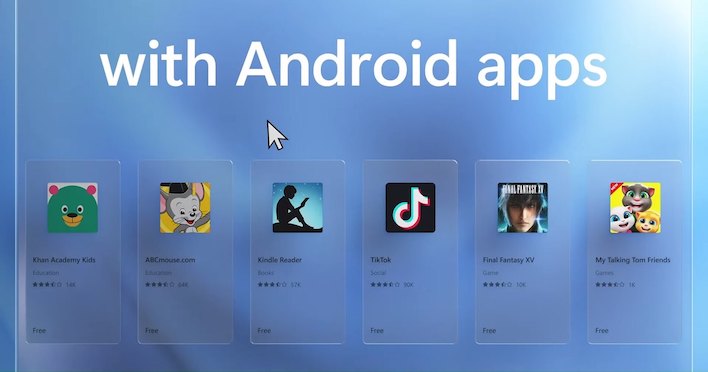Running Android Apps In Windows 11 Is A Big Deal But Support Won't Be Available At Launch
Windows 11 is coming just about six weeks from now, on October 5th -- at least, on new PCs. One of the biggest pieces of application-related news was the ability to run Android apps directly in Windows. Thanks to Intel, Android apps compiled for Arm64 would still be able to run on x86 PCs directly from Amazon's App Store. And it has already been confirmed that users can side loaded directly from an APK. Unfortunately, this technology isn't going to be ready for launch when the next version of Windows ships.
Presumably due to pressures brought on by both ChromeOS and macOS, Windows 11 will run Android apps natively. Intel's Bridge Technology is a runtime post-compiler that will prepare an Android app to run on the x86 host when the user launches it. It's not all that unlike most .NET apps released for Windows over the last 20 years, which uses a just-in-time (JIT) compiler to optimize code to run on the specific configuration of the host PC.

That's a little different than the tact that Apple took with macOS 11 Big Sur, because compatibility was limited to just Apple Silicon Macs with the M1 processor, leaving x86 behind. iOS apps just run on Big Sur, assuming the app author hasn't blocked the app from appearing on the Mac App Store. On the other hand, going from x86 to Arm64 is possible thanks to an install-time optimization that's part of Rosetta 2.
The problem is that it's going to be a while before Android app fans will be able to run those apps natively within Windows. In fact, Microsoft is being a little coy about when this feature will come. The company says in a blog post that an Insider Preview will enable this technology "in the coming months." There are still several months left in 2021, so it's possible we'll see it by the end of the year. However, this could also mean the tech will miss the launch window entirely and not be available until 2022.
Microsoft's approach doesn't require any pre-optimization like macOS, and it can run on any Windows 11 PC, not just Arm64. Both of those are big wins for Windows. Meanwhile, ChromeOS can only run Android apps from Google Play if they're built for the host machine's architecture without a huge performance penalty. Arm apps can run on x86 ChromeOS, but they're just translated without any optimizations, so they can run awfully slowly.
While it'll be a little bit before Android apps run on Windows, we're glad to see that the feature is still coming. Upgrades to Microsoft's latest OS will start sometime early next year once new PCs with the OS have launched. Not everyone will be able to upgrade, but Windows Update will explain why a machine gets bypassed. Manually updating is an option, but Windows Update may not be available if the PC is unsupported. Windows 10 will still be supported for quite a while, however, and Android apps should be there soon.


